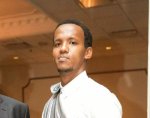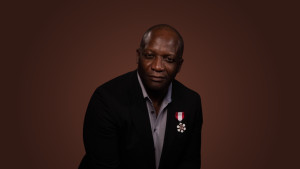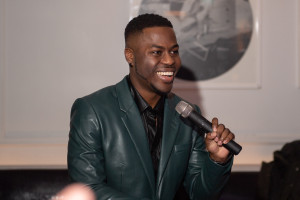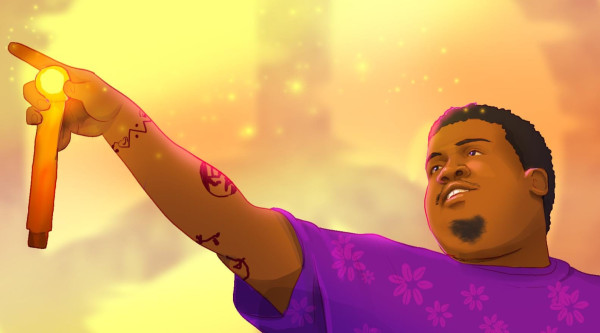But more importantly, Curtis exudes an aura of capability, optimism and determination.
You do not need a life coach to tell you those traits are ingredients for success. A former football player turned author/social entrepreneur, Carmichael is dedicated to future-proofing the hood. Tooled with technology, he embodies Black histories and philosophies, using that understanding to create paradigm shifts in education, economics and entrepreneurship.
No surprise that he made it onto the Forbes 30 under 30 list for education. But it is strange to talk so glowingly about a guy my age. It feels like he has lived a million lives in the time I learned to tie my shoe. As a member of Toronto Community Housing in Scarborough Curtis grew up among the promise and problems of the hood.
He credits the OGs, who acted as facilitators, for teaching him how to survive through hustling what you can and keeping your community close. Much of his life can be found in his self-written memoir Butterflies in the Trenches. Inspired by those lessons and the opportunities given to him by his parents, Curtis became a top 100 athlete in Canada and was on track to join the CFL. “Those were the doors open to most Black kids. But I realized not many people make it as an athlete or artist. You have a much better chance of being a doctor or lawyer.” As the child of two Guyanese immigrants, Curtis was always told he could do anything, and he believed them. Leaving his life as a footballer behind Carmichael thought of what to do next.
He knew he wanted to do something for the community, but what? Following in the footsteps of legendary Canadian Terry Fox, Curtis raised money for the Toronto Community Housing by biking across Canada. After raising $100,000 in sixty days he never took his foot off the pedal. “Raising the money was nice, but I wanted to do something more sustainable for the community.”
{https://www.instagram.com/p/CUgRf4bD18r/}
While the Black Panthers are a thing of legend in the Black community, Curtis saw the future in Nipsey Hussle. “Nipsey was really doing it. He was creating for his community through entrepreneurship. He owned clothing businesses, marketing agencies and business incubators. In terms of creating for the community, he was one of the best.''
In that vein, Curtis transitioned into becoming a social entrepreneur. By providing spaces for communities to innovate he wants to empower the community hustlers to create something extraordinary. Through Source Code Academy Curtis is bringing that vision to us all. The academy seeks to inspire what Carmichael calls “hustle entrepreneurship”, offering cross-disciplinary learning opportunities in the form of workshops, events, mentorship, and year-round educational programming.
“It was on the streets I learned the best lessons on how to run a business, while the people there may not have all the resources they do have the knowledge and spirit to run successful businesses”.
Would Source Code Academy just be another incubator relying on outside institutions like the government or banks for money? The Black Panthers created community hubs not to start businesses necessarily, but to give hot meals, education and political campaigning. They built self-reliant institutions that answered to the people. How would his vision exist in our current late-stage capitalist system, which many Black legends including the Black Panthers believed was antithetical to Black life?
This is where his brilliance really kicks in. As a computer scientist, Carmichael works with networks, and it's how things are networked together that matters. His vision works similarly. “ I do not want a Source Code Academy (SCA) around the world, but instead for us to act as a Geek Squad for different communities. I hope they do not even use that name. Each hub should be named for the community it serves. We want a hub system that gives specific communities like Warden Woods autonomy over what they do, while we provide resources and help.” Choosing to decentralize control, Curtis wants SCA to be a liberatory practice.
Precolonial African structures worked in many of the same ways. Civilizations like the Igbos and Tswana would decentralize control to different communities as a means of checks and balances. By giving locals final decisions over what they do and how they do it Carmichael is imbuing his system with a respect for the community not as a victim, but as changemakers. This lies in contrast to much of the corporate and nonprofit world delineated by large bureaucracies and mandates to “include” communities in their own development. But never to give them control. That stays with the power brokers. “When we get donations or funding we tell donors that they must invest according to our principles, we do not change for them, they change for us.”
So what is next for Curtis? A doctorate. He is applying to the STEM leadership and urban education program at Hampton University. As one of the top historically Black universities in the world, the school is the perfect place to match his experience practising in communities, with the theory to hold it all together. “ I just can't find the same sort of academics in Canada, but it is strong in the US, where the ideas originated. I'm excited to work with people who are also dedicated to the same abolitionist perspectives because that is not something I had before.”
To be Black, radical and educated is a powerful base to build a movement. A homegrown superhero, Carmichael is not here to save us but to help us save ourselves.

 By
By 








